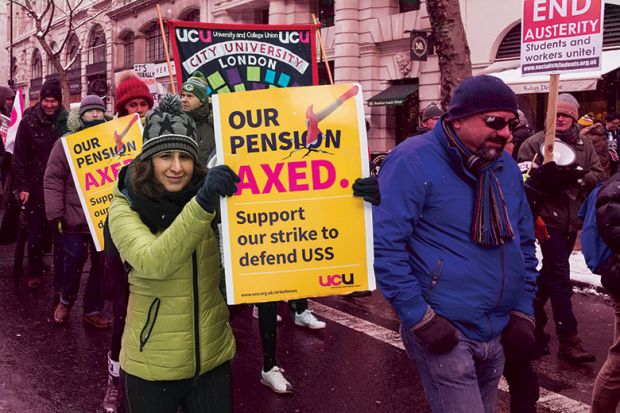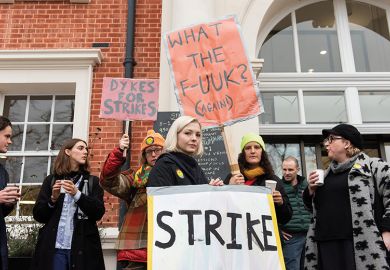As we all know, Christmas is a time of peace, goodwill and family feuding.
Take the UK university sector. The departmental parties and vice-chancellors’ seasonal messages follow eight days of strikes by members of the University and College Union over two separate issues: Universities UK’s demand that employees pay more into the Universities Superannuation Scheme and the falling value of academics’ real pay over the past decade, combined with the increasing numbers of teaching staff on temporary contracts.
The two matters are closely related – and the USS’ problems lie behind much of the strain.
Many academics have failed to understand what the USS is: a funded pension scheme like all other private sector pensions, rather than a pay-as you-go system like the state pension. The USS presents information to members showing that it takes in more income in contributions and investment returns than it pays out in benefits. Some, therefore, don’t see the need for increased contributions.
Nor is the wrangling over the actual size of the deficit it is running helped by the USS’ publication of multiple measures: that of its actuary, that according to accounting standards and that calculated by the Pension Protection Fund, which covers payments when a scheme fails.
Under its preferred actuary’s definition, the USS has a deficit well under half that shown by accounting standards. However, the UCU argues that even that deficit is grossly overstated and demands a higher discount rate. Some go so far as to argue that the scheme’s assets are also understated, since the equities it owns will be worth a lot more by the time the benefits that they back come to be paid.
This implies support for a strategy that the USS itself has long backed: aggressive investment in stocks and alternative assets. What is overlooked, though, is that higher returns are associated with higher risks – which can mean losses. At a conference at UCL in June, UCU general secretary Jo Grady blamed USS investment strategy for the scheme’s problems. But when asked if the strategy was too risky or too risk averse, she did not answer.
The Pensions Regulator seems to have had its fill. In August, it sent a letter to the scheme warning that it is “at the very limit” of what is acceptable and that it’s time to pull its socks up. This will require universities to pay more into the scheme. But they have only so much money. They can scarcely go cap in hand to the government because the USS has made a poor job of managing itself. They will find it difficult to put up domestic student fees in this political climate. They could reduce staff-to-student ratios, cut library budgets and fail to upgrade their IT or repaint the loos, but all this diminishes staff morale – and might not be enough.
They could also cut senior pay. This would hardly solve the problem either, but it might show that “we are all in this together”. The current chair of USS trustees, on top of his university salary, receives an annual fee of £90,000. Two senior investment managers receive salaries above £1.6 million, despite the scheme’s failure to meet its most recent one-year and five-year benchmarks.
Either way, universities will probably have to restrain pay and conditions further and insist on higher employee contributions. Cue more protests. Moreover, casualisation hits pensions because if people remain in the USS for only a short period, they become “deferred pensioners” rather than active members. The higher its proportion of retired and deferred pensioners, the more a pension scheme should invest in bonds rather than equities.
The original 14 days of pension strikes in 2018 were ended with the nomination of a joint expert panel by the UCU and UUK to review the USS valuation. But its recommendation of increases to both employer and employee contributions has failed to bring resolution, and I cannot believe that its second report, published last Friday and referring to the establishment of yet more “joint bodies” and “dual discount rates”, will have more success.
Staff morale has been further reduced by universities’ increasing customer orientation. Students want what they pay for, especially those paying international fees. One reason the JEP solution was conceded was because Chinese authorities were concerned that their students were being short-changed. Will “foreign intervention” prevail again?
Of course, the USS could collapse from the inside, too. Its multi-employer status has been used by those denying the need for reform as indicating the strength of the “covenant” behind the scheme. Universities together, they argue, are strong. But they are only as strong as “the last man standing”. This, it was agreed, was Trinity College, Cambridge. But Trinity has decided that it can do better with its own plan and has pulled out. The next last man is a bit weaker; he, too, might be having his doubts.
Universities have been warned against overestimating student numbers. If they do fail to recruit as expected, whole institutions may close. The old universities might feel they are better placed than the “new” ones. But any failure by the former would be a further weakening of the covenant.
Both the Office for Students and the Pensions Regulator are concerned about the impact the USS can have on university finances. I share their concerns. This is one more reason why I’m happy I have now retired. I can leave others to carve up the turkey.
Bernard H. Casey is a retired USS member who also worked for the Organisation for Economic Cooperation and Development. He now runs a consultancy, SOCialECONomicRESearch, in Frankfurt and London.
Register to continue
Why register?
- Registration is free and only takes a moment
- Once registered, you can read 3 articles a month
- Sign up for our newsletter
Subscribe
Or subscribe for unlimited access to:
- Unlimited access to news, views, insights & reviews
- Digital editions
- Digital access to THE’s university and college rankings analysis
Already registered or a current subscriber?







